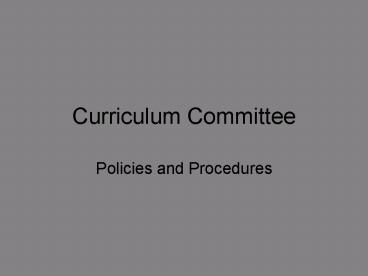Curriculum Committee - PowerPoint PPT Presentation
1 / 8
Title:
Curriculum Committee
Description:
The Curriculum Committee will serve as the faculty decision-making body ... John Meuleman: Geriatrics. Louis Ritz: Neuroscience. Peggy Wallace: Molecular Genetics ... – PowerPoint PPT presentation
Number of Views:806
Avg rating:3.0/5.0
Title: Curriculum Committee
1
Curriculum Committee
- Policies and Procedures
2
Role
- The Curriculum Committee will serve as the
faculty decision-making body regarding content,
methods, timing, and structure of the medical
curriculum, and through the Evaluation
Subcommittee, will make qualitative decisions
regarding the efficacy of existing coursework.
The Evaluation Subcommittee will be organized by
the Associate Dean for Program Evaluation and
Development. The Curriculum Committee will work
with the Associate Dean for Medical Education,
who will implement through the faculty the
curricular decisions after approval by the Dean.
3
Composition and Responsibilities of the Committee
- A minimum of 11 committed educators without
parochial, political, or departmental influence
from basic science and clinical faculty, as well
as representatives of the Gainesville community
or other colleges of the Health Science Center
when appropriate. - The academic chairs from third and fourth year
classes will be voting members of the committee. - Committee members are expected to prepare for and
attend the committee meetings, as well as
participate in task forces or subcommittees at
the discretion of the chair. Failure to
participate will require replacement on the
committee.
4
Ex Officio Members
- Ex officio members of the committee include the
Dean of the College of Medicine, the Senior
Associate Dean for Education, the Associate Deans
for Education in Gainesville and Jacksonville,
and the Associate Dean of Program Evaluation and
Development. Additional ex officio members will
include the chairs of the clerkship and course
directors committees an Assistant Dean for
Minority Affairs the medical director and
director of the Harrell Assessment Center the
Associate Dean for Information Technology
representatives of the Physicians Assistant
Program and the Health Science Center library
the Associate Director of Faculty Development
and medical student representatives (Academic
Chairs) from the first and second year classes.
Ex officio members of the committee may vote on
specific topics at the discretion of the chair.
5
Current Members, Curriculum Committee
- Maureen Novak Pediatrics
- Heather Harrell Medicine
- Mike Chen Surgery
- Rob Hatch CHFM
- Sig Normann Pathology
- Colin Sumners Physiology
- Mark Gold Psychiatry
- John Meuleman Geriatrics
- Louis Ritz Neuroscience
- Peggy Wallace Molecular Genetics
- David Caro Emergency Medicine (Jax)
- Andrew Kaunitz OB-GYN (Jax)
- Suki SubbiahMS4
- Doug Arnold MS3
- Bhavin Adhyaru MS2
- Omayra Marrero MS1
6
The Curriculum
- The curriculum is based on twelve learning
principles which were approved by the Committee
in 1997. - Learning objectives were developed for each
principle. - Evaluation of competencies are the way we
evaluate our students and our curriculum these
competencies serve as a blueprint for the
development of new curricular content.
7
Areas of Emphasis 2005-6
- Review the goals and objectives by which we
propose to meet our Educational Principles - Assisting the Office of Program Evaluation and
Faculty Development to successfully prepare for
LCME accreditation - Discuss consistency of grading, including a
revision of the Harris Report
8
Areas of Emphasis 2005-6
- Increasing class size and increased need for
clinical sites as well as more faculty
participation in the educational effort. - Revised approach to the fourth year, with the
concept of an active learning role for addressing
deficiencies in knowledge base. - Initiate a dialogue concerning residency
selection that addresses the emerging needs of
society (Principle 9)































